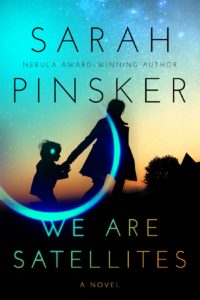
Sarah Pinsker has written some of my absolute favorite short fiction over the last couple years. And while I know the jump from short fiction to extended work is non-trivial, her shorts had hit a level of consistent quality that made it an easy call to move her second novel to the top of my list as I was catching up on 2021 publications. That We Are Satellites had an intriguing near-future sci-fi premise only served to confirm the decision.
We Are Satellites tells the story of a new piece of technology that quickly becomes ubiquitous in American society, filtered through the lens of a family of four and their varied experiences with the tech. That technology is the Pilot, an implant that interfaces directly with the human brain to improve processing speed and allows users to effectively multitask. When she begins to see users among her high school students, Val is skeptical, whereas her wife Julie and teenage son David are intrigued enough to join the growing wave of the Piloted—despite knowing that Sophie, an elementary-schooler who suffers from persistent seizures, will never be considered a good candidate for the implant.
At its best, We Are Satellites is enthralling, provocative, and messy. It asks a lot of questions about both the dangers of new technology and about the people left behind when particular technologies become ubiquitous, and it does this while telling a series of deeply human stories about ordinary people affected in various ways by the tech. The portrayals of the debilitating effects of overstimulation and of medical problems dismissed by the doctors are particularly excellent. But it seems to be of two minds about how to handle the storytelling trade-offs—messier and more personal vignettes tend to inhibit plot progression, and a driving central narrative smooths over some of the details—which keeps it from carving out a central identity as a novel.
We Are Satellites opens in the Pilot’s early adoption phase and progresses through to full market saturation, with significant time skips between sections. As such, the focal characters tend to shift. What starts as a story of parents trying to make the right decisions for their kids turns into a tale of adult children reckoning with those consequences and carving their own path forward. This shift comes naturally, and I was interested enough in how David and Sophie developed to not miss Val’s waning point-of-view sections. It does make for a story that meanders, without an obvious central plot. And without a strong thread tying them together, some perspectives are more gripping than others. But each vignette is well-told, diving into the human consequences of every decision while offering precious few easy answers.
But then the plot returns, with each character’s story coming back together for a thrilling finish. And the finish is well set-up, with seeds in the small stories that flower together in a denouement that offers plenty of excitement and catharsis. But the late convergence papers over so many of the hard questions, replacing them with a clear villain and a tidy resolution. It makes for an entertaining finish, no doubt, but one that loses a lot of what had made the book so good to that point.
Both the finish and what came before have their own strengths and weaknesses, and I probably derived more momentary enjoyment from the ending, while finding the meat of the book had more to say. Overall, it makes for a book that never quite came together to be a favorite, but excelled in so many individual elements to be well worth the read regardless.
Recommended if you like: near-future sci-fi, tough questions about technology, slices of life.
Can I use it for Bingo? It’s hard mode for Found Family, and also a 2021 Release with a Trans or Non-binary Character.
Overall rating: 16 of Tar Vol’s 20. Four stars on Goodreads.
